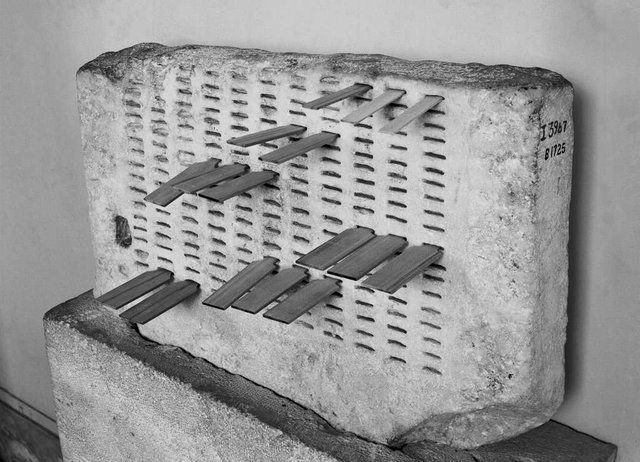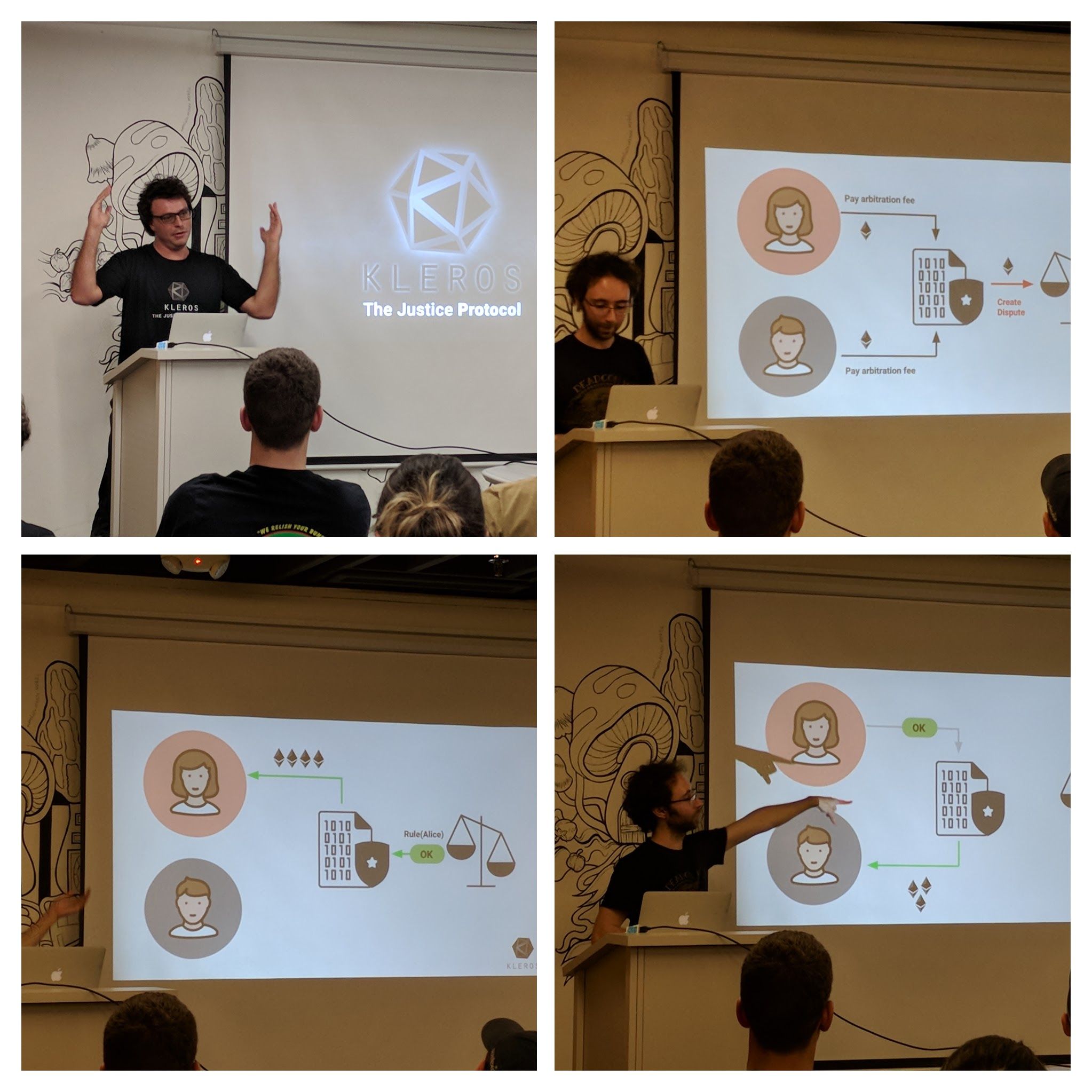Kleros decentralized dispute resolution project
Tonight I saw a presentation by Federico Ast and Clément Lesaege of the Kleros decentralized justice project. Here is the summary of what it is from the Kleros whitepaper
Kleros is a decentralized application built on top of Ethereum that works as a decentralized third party to arbitrate disputes in every kind of contract, from very simple to highly complex ones. It relies on game theoretic incentives to have jurors rule cases correctly. The result is a dispute resolution system that renders ultimate judgments in a fast, inexpensive, reliable and decentralized way.
It is intended as a solution for the increasing needs for dispute resolution in a fast efficient way in a world where everything else can be automated but human factors dramatically impede automation of this area. As Kleros describe it:
Existing dispute resolution technologies are too slow, too expensive and too unreliable for a decentralized global economy operating in real time. A fast, inexpensive, transparent, reliable and decentralized dispute resolution mechanism that renders ultimate judgments about the enforceability of smart contracts is a key institution for the blockchain era.
The Kleros protocol is named after a machine used in ancient Athens to randomly select jurors, it was called the kleroterion.

By Marsyas (Own work) [CC BY-SA 2.5 (https://creativecommons.org/licenses/by-sa/2.5)], via Wikimedia Commons
The token for Kleros is called Pinakion after the nameplates that the Greeks of Athens were given to identify themselves:

The pinakion were then inserted into the kleroterion:

Justice in Greece was "peer to peer" in modern times we introduced the notion that only certain people were allowed to judge. Kleros once again seeks to allow anyone to be a judge again, but with the twist that it seeks to use economic incentives to encourage good voting behavior.
With Kleros when both parties in a service or contract agree to use of the system for dispute resolution the payment for the service goes into a smart contract, and not directly to the recipient. Release of the funds to pay the service provider occurs if both parties agree. If either one has a dispute they can pay an arbitration fee. Arbitration only occurs when both pay the fee but both will have an economic incentive to do so to release funds. If the buyer disputes the transaction and pays then the payment is blocked until arbitration completes. The only chance of being paid for the seller is to pay the arbitration fee. I guess the service or product provider/seller could refuse to pay the arbitration and give up the money as a lost cause because they know they will lose. In theory they would not do that because it would ruin their reputation within the system.
After arbitration fees are paid the jurors are selected from a pool who have staked some pinakion coins to be jurors for disputes of a given area of expertise. If they vote against the majority they lose their stake. In theory anyone could ask to be a juror for any specialty, however doing so risks not being able to make the right decision and losing their staked coins.
The winner of the dispute as determined by the jury gets their arbitration fee and the loser pays. If the seller loses they also don't get the fee for the service, or whatever the disputed amount is (which could in theory be less than the total). If the buyer/customer loses they have to pay the arbitration cost and don't get a refund of the amount paid.
An appeal of the result is possible. Again both parties must stake an arbitration fee, but the appealing party must stake an additional fee which increases with each round of appeal making it more and more costly to keep escalating. In addition, it is expected that the number of jurors and the juror pool increases at each round.

Some highlighted issues that Kleros faces are
- bribing of jurors
- a collusion of jurors
- parties in the dispute lying or fabricating evidence - hopefully minimized by increasing digital records, or limiting Kleros to cases that have availability of high-quality evidence that is difficult or impossible to forge.
These things are partly mitigated by jurors being anonymous unless they somehow deliberately identify themselves. Since they may by dealing with evidence personally identifies the parties they could individually or as a whole choose to contact one or both parties to sell their vote. A party could then put jurors in touch with each other and allow them to collude together. Obviously doing this is highly risky for all parties concerned.
One issue that came up is how a juror could anonymously offer to accept a bribe via contracts. The juror creates a contract that will not pay them unless they vote in a certain way, it uses an oracle to view the outcome of the Kleros contract. The party offering the bribe payment commits funds for payment of the crooked juror. Obviously evidence of this type of collusion would be on the blockchain irrevokably. It might be possible to search for such collusion since it would have a dependency on a known contract or would need to use a trusted oracle to observe it indirectly.
There would be an economic incentive to find such evidence and present it to the losing party to support an appeal. I think Kleros could introduce an extra bond that jurors need to stake that would be forfeited if they are discovered cheating, one that cannot be released quickly, or only gradually. This would seriously discourage collusion - a juror should be able to make far more money doing their job well vs. colluding.
Some other random things I made a note of...
Kleros is built on Ethereum blockchain and they submitted an EIP for their protocol. You just need to create your contract to implement the two interfaces... see EIP 792 for futher details.
You can (or could) have the delegation of voting to a trusted 3rd party. This would allow you to stake as a juror in areas you do not have any expertise, but the expert cannot afford to stake.
Voting randomly could be tempting if analysis will be too time-consuming but voting randomly is basically a 50-50 gamble that you'll win or lose so why bother? The only time you should do that would be if you have reason to believe other jurors are all voting randomly, therefore, you expert vote would make you more likely to lose. This should not be the case as there is no incentive for jurors to begin to vote randomly.
I asked if zero-knowledge (ZK) proofs could be used to make voting anonymous therefore blocking collision. The problem becomes you have to know who voted which way to reward those who vote correctly. So it's theoretically possible but probably not practically possible to prevent bribery.
I asked how do you model expertise of the jurors? The answer was you don't, anyone can be one and they are not selected based on expertise. Having to be right to get rewarded is their incentive to be experts and ruling on areas in which they have the expertise to be right. That has the problem that if there is not a preponderance of real experts in the jury pool then you just have to vote in a way that is usually the way of the "popular vote". That could include exploiting biases when the identity of the parties is involved. As we know in real life allowing parties to reject jurors can remove as well as create biases. Demonstrating a lack of bias would be required. Since there is apparently not "voting record" it would be difficult to show which jurors are biased, only that aggregate results show bias across the aggregate of jurors.
I didn't ask this but I wanted to - how do you model reputation of parties in the contract so that punishing bad behavior works? As was stated there is no voting record, but surely there should be records of the parties and how the acted in a dispute and what the jury ruling was.
I would also point out that any system like this is subject to jury nullification. Say a dispute involves a rule that most normal people think is dumb, unfair, or unjust. Say they think that enforcing that rule and having one party forfeit their payment is unjust punishment. There is nothing to stop them just voting their heart in a way that ignores the rule. Yes it might cost them but they might be willing to pay the cost to uphold their strongly held principles. They might even have funding to vote in that way. If the majority of jurors feel that way and vote their heart they will win. That is effectively jury nullification. IMO that is probably a good thing, but remember that nullification can go both ways - there is no guarantee that juries doing it will favor the side or result you want to see.
Technically the appeal process should stop nullification from happening - an appeal could just point out that the result contravened clearly stated rules and should be overturned. The assumption is the appeal "court" is larger and harder to bribe or less likely to be swayed by niche concerns. But if the rule touches on a popular issue - as in popular among all jurors - then there is no guarantee that appeal and appeal of appeal and ... won't keep ruling the same way to the point where juror pools are exhausted or funds are depleated.
About Kleros
Their system doesn't involve any fee "for the house". There is no incentive to just own their coin and hold it to make money. You make money by using the system, or is us drives up demand. Bad outcomes would cause declining use of Kleros and decreased value of coins held.
Competitors for Kleros would be Aragon, Jury online (centralized system), and Augur which is closest to Kleros but only for prediction market disputes.
Some questions I had but didn't get around to asking or didn't think of at the time...
- Do jurors whose verdict goes to appeal lose their stake if appeal overrules? I'm assuming so.
- When an appeal happens wouldn't it help to know a jurors voting record?
- I wasn't following all of the discussion but it seems like a pool of jurors could become biased if an excess of jurors who always vote one way crowd that pool or is the appeal process intended to eliminate that?
Great review! We have an AMA open on reddit were you can submit those questions to Kleros Team.